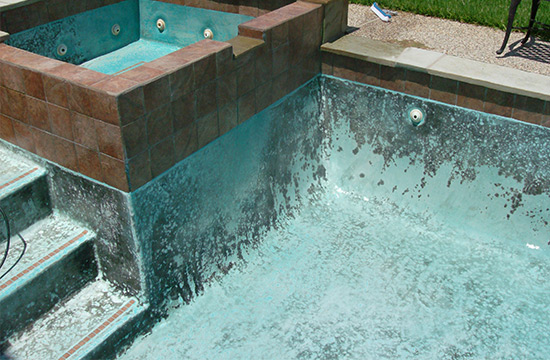Pool Leak Detection: Causes and Prevention
Swimming pools are the perfect things to help you relax during the hot summer months. But if you’ve got a leak in your system, you’re looking at a headache.
Some evaporation is typical when the sun’s blazing on long days. However, significant water loss could indicate that you’ve got another problem.
Today, we’re looking at some typical causes of leaky pools and how to treat and prevent them.
Let’s dive in!
What are the most common signs of a pool leak?
Your perfect backyard oasis can quickly become a money pit if you’ve got a severe leak. Even small leaks can add up to big water bills, though. Finding and treating this issue quickly is in your best interest. Thankfully, pool leak detection isn’t rocket science, and you can usually do it on your own.
Here are some typical signs that you might have a leak.
Algae may grow unexpectedly
Adding untreated water into your pool to top it off from a leak can dilute the chemicals in your pool. The chemical balance of your pool is delicate, and when it’s off, nature takes advantage. Even in a clean pool, algae can take hold.
Instead of just adding more chemicals, you should find and treat the source of the leak!
Standing water under your pool equipment is a common sign of a pool leak
As you check your filtration and other pool and spa equipment, it should dry underneath. Ideally, your filtration is a closed system, meaning no water gets in or out. But if water pools under your unit, there’s likely a leak.
Check all of your connections to see if they’re damp or dripping. You’ve likely found at least one of your issues if they are.
If your water bill and electricity bill is unusually high, it may be a pool leak
Each month, you get a bill that can help you detect a water leak. Your water and electricity bills usually climb in the summer months. However, if you see a spike in water consumption or energy usage beyond that, you might have a pool leak.
An auto-filler compensating for leaks can consume significant amounts of water and electricity.
The pipes corroding can be caused by pool leaks
Most pools use PVC or chlorinated PVC pipes to run their water systems. Older pools, though, may have copper pipes instead. Over time, hard water can corrode pipes and cause failure. If you notice that your system is corroded or you have rust stains in the liner, you might have a pool leak.
Common causes of a pool leak
Pools are relatively simple systems, and many times, leaks are caused by the same culprits. Knowing what to look for can help you spot a leak early!
Mechanical issues are usually the cause of pool leaks
Most pools don’t have many moving parts beyond their filtration equipment. Here is where you’ll find most leaks because this is where most of the water moves through. You could have a clogged filter, heater, pump, or pipe valves. Additionally, cracks in connections can lead to standing water and significant water loss.
Plumbing problems will need a professional
In-ground pools run much of their plumbing under the soil. Standing water on your lawn or around your pump station lets you know there might be a problem. While you can certainly grab a shovel and start digging, you could accidentally damage your plumbing system and cause a bigger issue.
Unless you can see where the leak is, it’s a good idea to call the professionals for this type of problem. They’ve got the right tools and expertise to diagnose where the leak is coming from safely.
Structural damage can be easy to spot
Sometimes, leaks are caused by structural damage to your pool. These could be cracks in the liner or missing grout that allows water to escape. Usually caused by a pool settling into the ground, these issues are easy to spot.
But just because you can see the problem doesn’t mean you can fix it yourself. You’ll frequently need a specialist to come out and see what repairs are necessary. They can also check the rest of your system to ensure that it’s not also been damaged.
How you can prevent pool leaks in the future
Pool leaks are usually caused by mechanical and structural failures. But with regular maintenance and monitoring, you can prevent future pool leaks easily.
Keep your pool equipment up to date

At the beginning of each season, take stock of your pool equipment. Typically, pool equipment is good for at least eight years. Up to that point, it’s worth paying for repairs to your system. After that, replacing damaged components could be
more cost-effective than repairing them.
For instance, your pool pump is a pivotal part of your filtration system. It could be time for a new pump if you notice excess noise or your energy costs jump unexpectedly.
Catch early signs of a pool leak with a pool technician
When you’ve noticed signs that you might have a pool leak, it’s time to call in a technician. There could be a simple solution to your potential leak, and a technician can help you narrow it down. They’ll run some leak detection tests to see if there is a leak and provide an accurate assessment of your situation. They can also suggest the best solution.
Sometimes, as an added benefit, you can catch things early enough to minimize costs and damage.
GPS Pools is here to help keep your pool in great shape!
Get your pool in shape for swimming season with GPS Pools! Whether you have a leak or just want your system primed for summer, we’re here to help. Our expert team has decades of experience and can provide information about keeping your backyard oasis in top shape.
Check out our website for locations or to schedule a technician to assess your system.
